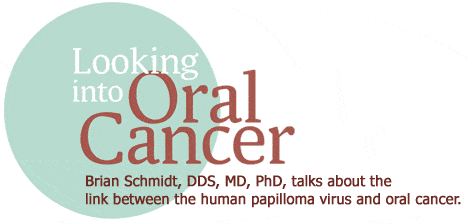
Looking into Oral Cancer
Brian Schmidt, DDS, MD, PhD, talks about the link between the human papilloma virus and oral cancer.
Q. Is there a link between human papilloma virus (HPV) and the development of oral cancer?
A. I would say that based on the existing data, that there is not a confirmed, direct link. Let’s talk about HPV and cancer in general. HPV clearly has a role in certain types of cancer. Almost certainly, for example, the majority of cases of cervical cancer are due to HPV infection. There are some types of head/neck cancer that we think are related to HPV infection, but when we talk about oral cancer, we think that link is still weak. We find the rates of HPV infection in cancers from the oral cavity are probably in the region of 10 to 15%.
When we talk about oral cancer, we’re talking about everything that involves the oral tongue anterior to the circumvallate papillae, and the remaining oral cavity, including the buccal mucosa, gingiva, floor of mouth, and the hard palate. This is different from the oropharyngeal area where the most common type of cancer is tonsillar cancer. We think that the link with HPV is probably stronger in this anatomical region.
Q. Who is most at risk for HPV-linked cancer?
A. The risk factors for head/neck cancer are primarily heavy tobacco smoking and alcohol use. There are many different types of the human papilloma virus, but certain types of HPV infections are definitely associated with tonsillar cancer.
About 50% of patients who have tonsillar cancer will test positive for one of the cancer causing types of HPV.
However, I always make the point that even though there are risk factors, I do see young patients who often have no risk factors who are diagnosed with oral cancer.
Q. Whether a patient is in a high risk group or not, what are your recommendations for dental professionals in screening for oral cancer in young patients?
A. Even young, healthy patients—who don’t have a history of tobacco or alcohol use—can have oral cancer. Usually, when I’m referred a young patient with oral cancer they’ve had it for some time. Often they have seen a number of doctors and no one suspected that someone so young could have oral cancer, resulting in a delay in diagnosis.
Every patient gets a head/neck and oral examination at every visit regardless of age. And that’s really the best way to catch oral cancers early, which gives patients an improved survival rate.
Q. Is it usually a physician or a dental professional who finds cancer in these younger people?
A. Dental professionals are way ahead in this area. A published study shows that dental professionals detect oral cancer much earlier, and not only do they pick them up earlier, but these patients have a better chance for survival.
From Dimensions of Dental Hygiene. November 2007;5(11): 28.

